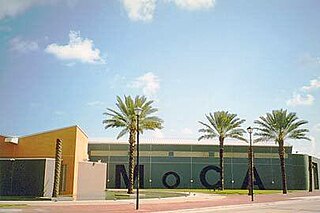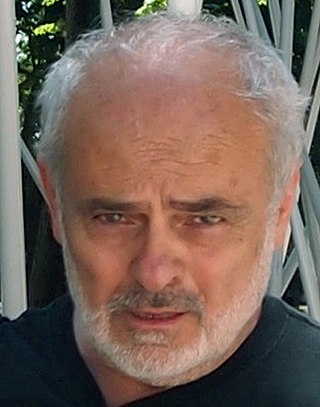
Carl Andre is an American minimalist artist recognized for his ordered linear and grid format sculptures and for the suspected murder of contemporary artist and wife, Ana Mendieta. His sculptures range from large public artworks, to large interior works exhibited on the floor, to small intimate works.

The Museum of Contemporary Art, Los Angeles (MOCA) is a contemporary art museum with two locations in greater Los Angeles, California. The main branch is located on Grand Avenue in Downtown Los Angeles, near the Walt Disney Concert Hall. MOCA's original space, initially intended as a temporary exhibit space while the main facility was built, is now known as the Geffen Contemporary, in the Little Tokyo district of downtown Los Angeles. Between 2000 and 2019, it operated a satellite facility at the Pacific Design Center facility in West Hollywood.
Barbara Kruger is an American conceptual artist and collagist associated with the Pictures Generation. She is most known for her collage style that consists of black-and-white photographs, overlaid with declarative captions, stated in white-on-red Futura Bold Oblique or Helvetica Ultra Condensed text. The phrases in her works often include pronouns such as "you", "your", "I", "we", and "they", addressing cultural constructions of power, identity, consumerism, and sexuality. Kruger's artistic mediums include photography, sculpture, graphic design, architecture, as well as video and audio installations.

Yellow Arrow was a public art project created by Christopher Allen, Brian House, and Jesse Shapins that was active from 2004 to 2006. The project is an important example of locative media and mobile phone art and draws concepts from psychogeography.

Doug Aitken is an American multidisciplinary artist. Aitken's body of work ranges from photography, print media, sculpture, and architectural interventions, to narrative films, sound, single and multi-channel video works, installations, and live performance. He currently lives in Venice, California, and New York City.

Sam Durant is a multimedia artist whose works engage social, political, and cultural issues. Often referencing American history, his work explores culture and politics, engaging subjects such as the civil rights movement, southern rock music, and modernism.

The Museum of Contemporary Art (MOCA) is a collecting museum located in North Miami, Florida. The 23,000-square-foot (2,100 m2) building was designed by the architecture firm Gwathmey Siegel & Associates Architects, New York City.

Joshua Neustein is a contemporary visual artist who lives and works in New York City. He is known for his Conceptual Art, environmental installations, Land Art, Postminimalist torn paper works, epistemic abstraction, deconstructed canvas works, and large-scale map paintings.
Rodarte is an American brand of clothing and accessories founded and headquartered in Los Angeles, California, USA, by sisters Kate and Laura Mulleavy.
Klaus Biesenbach is a German curator and museum director. He is the Director of the Neue Nationalgalerie, with Berggruen Museum and Scharf-Gerstenberg Collection, as well as the Berlin Museum of Modern Art under construction, Museum des 20. Jahrhunderts.
Alexandra Grant is an American visual artist who examines language and written texts through painting, drawing, sculpture, video, and other media. She uses language and exchanges with writers as a source for much of that work. Grant examines the process of writing and ideas based in linguistic theory as it connects to art and creates visual images inspired by text and collaborative group installations based on that process. She is based in Los Angeles.

Jeffrey Deitch is an American art dealer and curator. He is best known for his gallery Deitch Projects (1996–2010) and curating groundbreaking exhibitions such as Lives (1975) and Post Human (1992), the latter of which has been credited with introducing the concept of "posthumanism" to popular culture. In 2010, ArtReview named him as the twelfth most influential person in the international art world.
Knifeandfork is an art collaborative formed in 2004 by American artists Brian House and Sue Huang. Knifeandfork projects are concerned with the critical reconfiguration of media structures and contexts and the group is known for their unconventional use of mobile and new media in their artworks.

Andrea Polli is an environmental artist and writer. Polli blends art and science to create widely varied media and technology artworks related to environmental issues. Her works are presented in various forms, she uses interactive websites, digital broadcasting, mobile applications, and performances, which allows her to reach a wider audience.
Helen Anne Molesworth is an American curator of contemporary art based in Los Angeles. From 2014 to 2018, she was the Chief Curator at The Museum of Contemporary Art (MOCA) in Los Angeles.

Jody Zellen is an American artist and educator. Her practice, consisting of digital art, painting, video art, and drawing, has been showcased by way of interactive installations, public art, and curated exhibitions. She is also known for her art criticism.
KCHUNG is a freeform radio station in the Chinatown neighborhood of Los Angeles as KChung Radio 1630 AM. KCHUNG broadcasts over 200 shows a month on 1630 AM and online through the station's website. The station operates according to what are generally known as the Part 15 rules, which cover very-low-power RF transmissions without a license.

Martine Syms is an American artist residing in Los Angeles, specializing in various mediums including publishing, video, installation, and performance. Her artistic endeavors revolve around themes of identity, particularly the representation of the self, with a focus on subjects like feminism and black culture. Syms frequently employs humor and social commentary as vehicles for exploration within her work. In 2007, she introduced the term "Conceptual Entrepreneur" to describe her artistic approach.
Data sonification is the presentation of data as sound using sonification. It is the auditory equivalent of the more established practice of data visualization.
Manuel López is an artist and educator based in Los Angeles, California. He is an emerging artist in the Chicano art scene and has shown his work at museums and galleries in Los Angeles, Chicago, and New York City. He specializes in traditional drawing and painting. López's cityscapes express the details he observes in his surroundings such as run-down houses, palm trees, and silent and still neighborhoods. Along with his surroundings, he also expresses the memories he holds of the experiences within his area.











